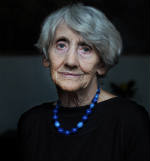Photo: Carlos París
HUNGER
THEY’RE hungry and their mouths are open.
A whole tree
could be put inside a mouth
and a whole
river,
even some mountains
with their peaks
and knolls. Everything would fit
wrapped
in saliva,
in white cloths.
The saliva
spreads
and softens the landscape:
some cows graze in the depths
of their innocence
and the horses jumping the fence
are like funerary steles.
Pity
for those who are grass and bone
because soon
they will be ground up by desire
under the sky set fire to and avidity
and the walls of the cosmos will move
and the landscape will be put away in the acid sack
of forgetfulness.
The desire to eat
the inedible:
the faithful dog, streets and sidewalks, buildings and trains.
The glass bonfire of the little town is alight.
Devouring, devouring, never mind how much and how.
Famine,
the sudden riptide of the spirits
a massive epidemic, voracity,
the windy swirling
of the carnivorous birds, the blacking out.
ROADS AT NIGHT
WHEN I turned 35
I yielded with a passion
to roads at night;
at that time I was travelling through the imaginary country we all build,
a country that followed me like my one blue shirt
or my handkerchief
in the left pocket.
I used then
to look out
of the window of the bus
and watch in a trance
the line that divides off
half the road,
that line
boldly crossed
by the coat of a fox
or the shadow of an owl escaping from the stare
of powerful headlights
or simply
the flicker
of a human
silhouette
fleeing from fatality
and from being run over.
The aisle inside the bus
was another road
with bodies huddled
in the fetal position.
The driver’s assistant
went up and down that passage leaning on the back
of the seats
and looking
inside the sleep
of the travelers.
There was silence
and some muttering of voices was the sporadic accompaniment of those hours.
The sleep you have
during a bus journey
produces sensory fatigue: nervous weakness, psychasthenia.
At the age of 35
I was already a traveler
through places of debauch and danger, and had discovered something
as important
as the familiar destination
awaited at the end of the route.
Finally
I was coming up with
what seemed
a metaphor for the country.
The novelist Enrique Bernardo Núñez
in A Glance at the Map of Venezuela
wrote this sentence:
Above all the land we have before us demands of us
an interpretation.
It must be about 2 a.m.
and the prow of the sleeper bus
slows down
and parks under the roof
at a roadside restaurant.
When the bus doors open
we unroll stunned
to the solitude of the urinals,
to the slot machine,
to the bread and coffee.
The light inside the place
was white
like a mist
brushing the heads of the travelers.
In the darkness
the road was still there
– immobile.
I know there’s a city near,
a wood near,
but how to relate them
and assemble with them
a universe.
The map of the country
is useless.
In spite
of the certainty of the night
if someone asked
what day is it?
and what year and what date?
I wouldn’t be able to answer.
So, that moment at a standstill
in a continuous present
seemed to me so like the country:
I mean the country
is like a roadside restaurant
at night.
These images have resounded
over years
like a wave expanding
and not dissolving.
I would say it’s a place of amnesia.
A West Indian poet called Walcott
also thinks so.
Amnesia
is the sight of some herons
alighting on the sea shore
after a long journey.
Pity rains
on that picture
and there’s no remedy.
Who remembers
a death that happened,
a buried past?
With calm eyes
I reread – again –
Una ojeada al mapa de Venezuela,
printed by Élite publishers in 1939:
“Sometimes, going through a village, I see abandoned houses.
The people have left there and with no effort have exchanged
their home for a cramped room in the cold city.”
In 1939
people still talked about “beautiful barbarism”
but today
slums armor-plate
the mountains
with their walls of orange bricks.
It’s the accursed circumstance
of the present everywhere.
Now,
when the bus draws away from the restaurant
there’s a moment when the facade
is imprinted
as a faint glow
in the enormous glass expanse
of the side windows.
I don’t understand why I recall
a journey to Greece
and my only visit
to the Acropolis
and the theater of Epidaurus.
My ruins
have always been:
the oil painting of a quiet mountain
or the incandescence
of the Caribbean coast at Macuto.
A country to be cherished
that will not come back again.
Translated from the Spanish by Rowena Hill



